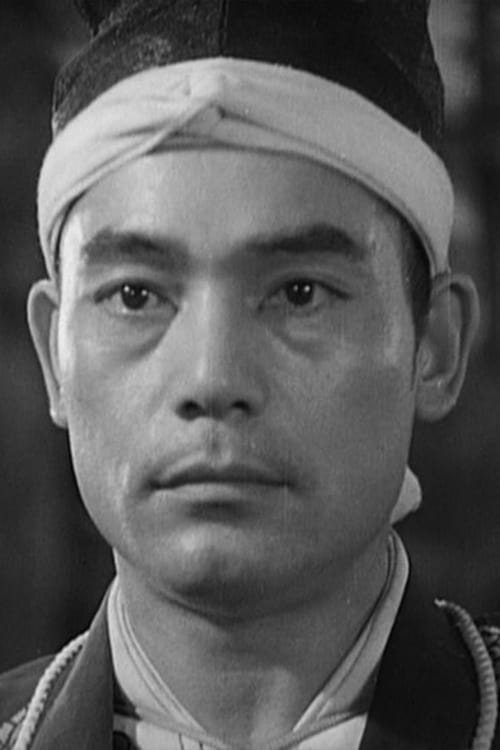
A narrative feature made from a collage of clips from various films around the world.

Gozo Kunizaki
Naomi is a university student who is leaving for the US to study in a week; Shuichi is a washed-up gumshoe who's hired by Naomi's father to bodygard his daughter until she leaves. Shuichi finds the job annoying and wants to quit. But he also has a screwed-up ex and alimony to pay. Things go from bad to worse when Naomi and Shuichi stumble upon a murder which might involve the yakuza. They decide to find out who committed the murder but God knows what it will lead to.
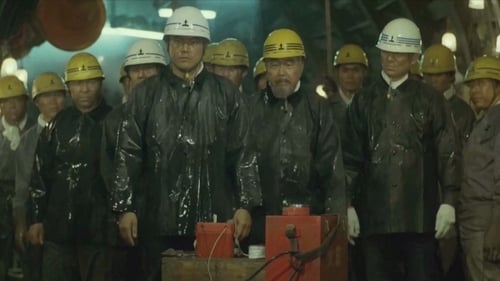
After a passenger ship sinks in 1954, Go Akutsu devises a life-saving project in the form of a tunnel under the Tsugaru Strait. While working on this project Akutsu becomes involved with Tae Makimura leading to his estrangement from his wife.

Depicting the friendship of three boys in New York, Los Angeles and Tokyo.

Navy Minister Oikawa
A lavish retelling of the true story of the final voyage and ultimate destruction and sinking of the battleship Yamato, Japan's greatest flagship during the Second World War.

A trio of high school boys get summer jobs at a seaside resort. Soon, however, they learn that the woman who runs it is in financial trouble. The three decide to help her.

Hanuemon Otowaya

Ryokichi Sakata
Kanno is a Yakuza. He had to kill Matsuoka who betrayed their boss. Kanno knew Matsuoka had a 3-year-old daughter named Youko. Before he gave himself to the police, he asked his trusted man to take care of her. While in prison, Kanno kept sending letters to Youko, disguising as an uncle in Brazil. 15 years later, Kanno is released. He is determined to live legitimately, however the Yakuza has not forgotten his wicked deed!

Mainly the story of Shinsuke and his stepmother, ranging from Shinsuke's infanthood to his mid-teens. Coal workers and the mines dominate nearly every aspect of the life of the characters. Shinsuke's father dies while bravely using dynamite to rescue a group of trapped Korean miners. Several older men attempt to help he and his mother cope, including a kind Korean and a Harley-riding yakuza.

A ruffian joins the ranks of the emperor’s guards.
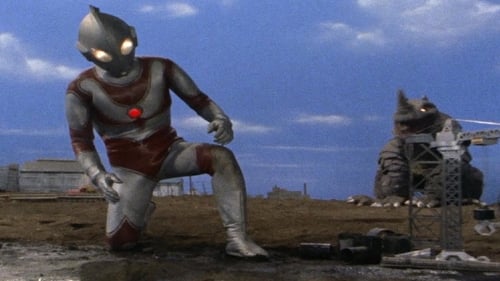
Chief Kishida
A theatrical release of The Return of Ultraman episodes 13-14. It was released on December 12, 1971 as part of the Toho Champion Festival along with Godzilla, Mothra, King Ghidorah: Earth's Greatest Battle ( edited from Ghidorah, the Three-Headed Monster and shorter versions of The Adventures of Hutch the Honeybee, and The Little Match Girl.

Former inmate Katsuji gets involved in the horse gambling business while lending a helping hand to a ranch operator.

Chief Kishida
Episodes 5 and 6 of Return of Ultraman show, screened at Toho Championship Festival.
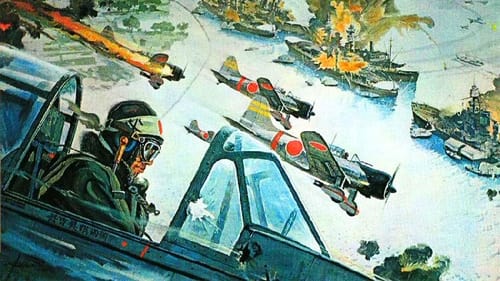
Rear Adm. Tamon Yamaguchi
Retrata de forma realista, quase documental, tanto do ponto de vista japonês como do norte americano, mostrando a preparação, os eventos e os erros que possibilitaram o ataque a Pearl Harbor em 7 de Dezembro de 1941, fato que forçou a entrada dos Estados Unidos da América na Segunda Guerra Mundial. O título do filme é o código utilizado em caso de sucesso do ataque japonês, que traduzido para o português significa 'Tigre! Tigre! Tigre!'. A versão Americana tem 02:25. A versão Japonesa é mais longa, com 02:29.

In the prewar days leading up to the Second Sino-Japanese War of 1937, head flight instructor Lt. Katō Tateo of the Imperial Japanese Army-Air Corps trains new volunteers from the Army's Infantry to become Japan's next generation of fighter pilots at the Tokorozawa Flying School. Flying Kawasaki Ko-4 biplanes, Lt. Katō will train both friend and future foe alike. But as war in China breaks out, Katō now in command of the 5th Rentai will take his untested men flying antiquated planes into aerial combat against the Chinese Air Force who is now headed by Lt. Cho who Katō both earlier befriended and personally trained himself. While Katō's squadron ultimately achieves air superiority over the skies of Manchuria, it comes at a high price in men to which each loss carries a heavy burden that he alone must carry. As the war widens into the Second World War, Captain Katō must battle an ever advancing array of deadlier new enemies flying ever more modern fighter planes.
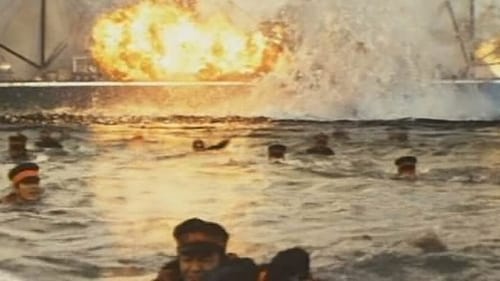
Uemura
Japão e Rússia entram em confronto no que ficou conhecido como Guerra Russo-Japonesa. Numa tentativa falhada de tomarem a fortaleza de Porto Artur com a frota e o exército japones, os russos avança com uma frota sobre o Mar do Japão. O almirante Heihachiro Togo envia a sua frota para enfrentar os russos, com resultados que surpreenderam ambas as nações. Enquanto isso, o major Genjiro Akashi negoceia secretamente com os revolucionários bolcheviques na Rússia, negociações essa que têm repercussões muito para além do conflito em questão.
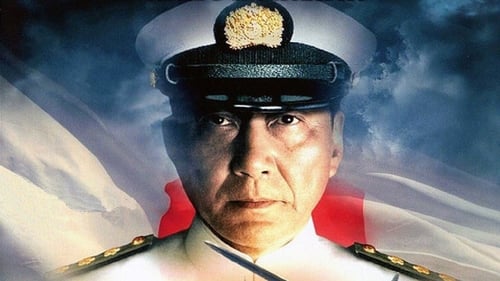
Kurita
As Japan joins in a political pact with Nazi Germany and fascist Italy, Admiral Isoroku Yamamoto is appointed supreme commander of the Japanese fleet. With Japan headed inexorably toward war, Yamamoto, despite his misgivings, believes the only possible victory lies in destroying the American fleet by surprise at Pearl Harbor. The attack succeeds, but fails to sink the American carrier fleet. Thus Yamamoto must lead the Japanese navy into war with ever-diminishing likelihood of success.

The second of two films based on the novel by Futaro Yamada.
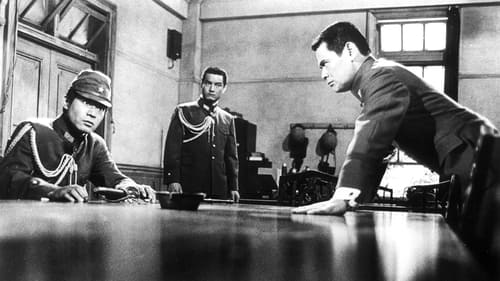
Colonel Toyojiro Haga - CO Imperial Guards 2nd Infantry Regiment
Following the detonation of the atomic bombs on Hiroshima and Nagasaki, the Japanese military and the government clash over the demand from the Allies for unconditional surrender. Minister of the Army Anami leads the military officers who propose to fight on, even to the death of every Japanese citizen. Emperor Hirohito, however, joins with his ministers in asking the unthinkable, the peaceful surrender of Japan. When the military plots a coup to overthrow the Emperor's civilian government, Anami must face the choice between his desires and loyalty to his Emperor.

Shogen the Instructor
Sasaki Kojiro tells the story of the genius who staked his love, glory, and life on a duel with the supreme master of the sword, Miyamoto Musashi (Tatsuya Nakadai). Oscar winning Hiroshi Inagaki directs this epic motion picture based on Genzo Murakami’s fascinating story. Despite his humble birth, the orphan Sasaki Kojiro (Onoe Kikunosuke) is determined to become the foremost swordsman in all Japan, a title that traditionally belongs to a nobleman. At fencing school, young Kojiro receives the contempt of his classmates because of his superior swordsmanship. When rumors of the upcoming civil war between Toyotomi and Tokugawa clans spread, Kojiro leaves the school and sets out, seizing every opportunity to realize his dream.
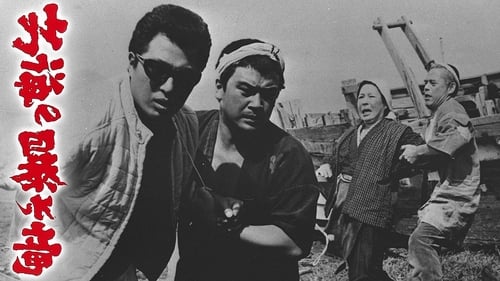
The son of a prominent member of a fishing community returns home after a stint with the yakuza to find his father has died under orders of a local gang leader. He sets out to avenge his father, keeping his plans secret from his mother who is cold to him since his perceived abandonment of the family. This wonderful, if little-seen, Fulasaku gem deals with family, community and what it means to do right by both.

Tokutaro Hayami
A lone wolf tries to eliminate a drug-smuggling operation.

Japanese war movie.
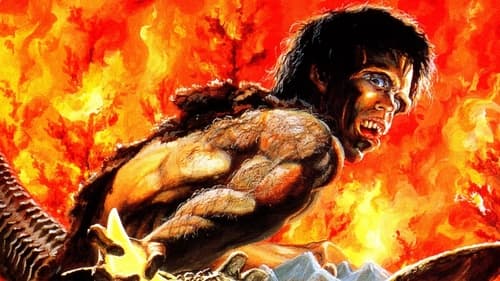
Osaka Police Chief
During WWII, Germans obtain the immortal heart of Frankenstein's monster and transport it to Japan to prevent it being seized by the Allies. Kept in a Hiroshima laboratory, it is seeming lost when the United States destroys the city with the atomic bomb. Years later a wild boy is discovered wandering the streets of the city alone, born of the immortal heart.

Akitani
In 1943, the Aleutian island of Kiska was fortified by a small contingent of Japanese soldiers. When word arrived of an impending attack by an overwhelming force of Americans, the Japanese Navy attempted one of the most daring and unlikely evacuations in military history. This is that story.

The first of two films based on the novel by Futaro Yamada.
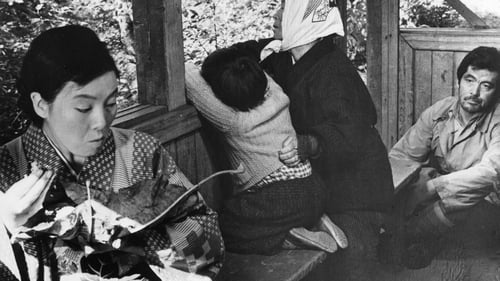
Police Chief
Three robbers escape with loot from a heist before one of them kills the others. Their corpses wash up near the aftermath of a maritime calamity, provoking a policeman's interest.
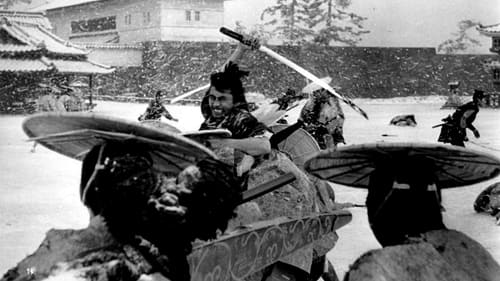
Tatewaki Todo
Japan, 1860. The men of the Mito clan, victims of the Ansei purge, anxiously prowl around the Sakurada Gate of Edo Castle with the intention of assassinating Naosuke Ii of Hikone, tairō of the Tokugawa shogunate and responsible for their misfortune.
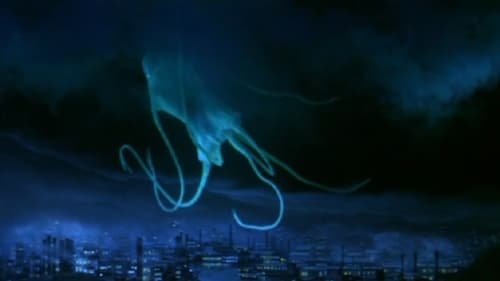
General Iwasa
A floating amorphous life-form descends from the atmosphere to consume carbon in the form of diamonds.
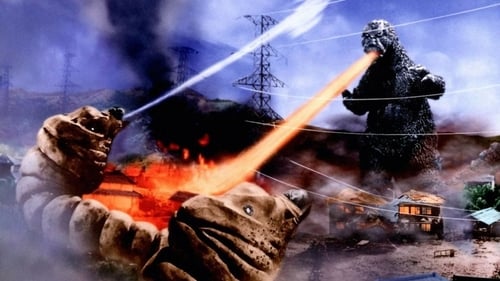
Head of JSDF task force
Após um feroz tufão, o gigantesco ovo de Mothra é trazido até o Japão. Empresários gananciosos compram o ovo e se recusam a devolvê-lo ao povo de Mothra. Com seus pedidos negados, Godzilla aparece em Nagoya, e o povo de Mothra deve decidir se está disposto a ajudar o Japão.
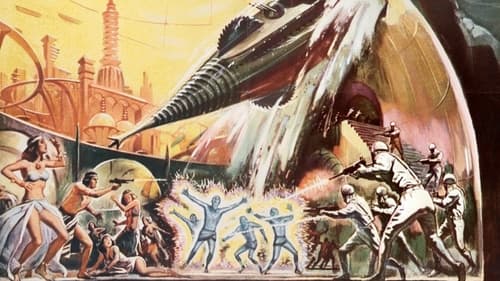
Defense Commander
The legendary empire of the lost continent of Mu reappears to threaten the world with domination. While countries unite to resist, an isolated World War II Captain has created the greatest warship ever seen, and possibly the surface world's only defense.

Kagawa Tanomo
This Japanese action-adventure is set in the 17th century when all forms of swordplay were banned. One fighter, an excellent swordsman believes the law is unfair. His brother keeps his opinions about the law to himself. The swordsman vents his frustration by cutting off the thumbs of an enemy. The fighter is then banished. To live, he becomes a thief. To restore the family's lost honor, the other brother is forced to challenge the fighter to a duel.

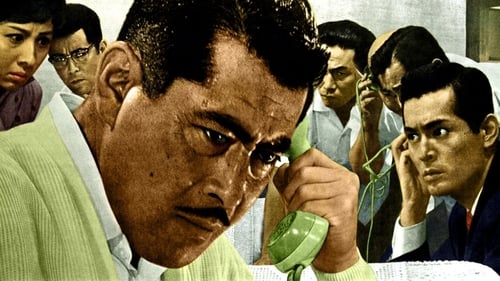
Chief of First Investigating Section
Um executivo de uma empresa de calçados torna-se vítima de extorsão quando o filho de seu motorista é sequestrado e pedem resgate.
O executivo Gondo (Toshirô Mifune) hipoteca tudo o que tem na tentativa de assumir a Companhia Nacional de Sapatos, para manter a empresa fora das mãos dos outros executivos incompetentes e gananciosos. Contudo, o mesmo dinheiro que ele arrecada pode pagar o resgate que possivelmente irá salvara vida de uma criança, levando o executivo a tomar decisões extremas e elaborar procedimentos policiais. A resolução desse dilema - a perda certa da empresa vs a perda provável da criança - cria um drama distinto, e um elaborado procedimento de polícia cria um segundo. (e 12 - Estimado 12 Anos)
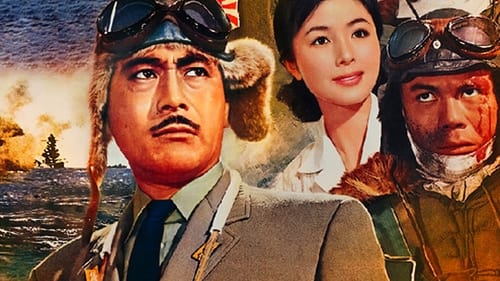
Yamato Commander Ito
Lt. Col. Senda resists the idea of sending Japanese fighter pilots on suicide missions. He believes that what is really necessary for Japan to regain momentum in the war is for the air force to gather its most brilliant pilots into an elite squadron and use the unit to pinpoint attacks on the Americans. Disrespected by the kamikaze pilots who think the "non-suicidal" pilots are afraid, the unit redeems itself by stunning victories. But success leads the military leaders to expect too much of the unit, and new orders portend disaster.
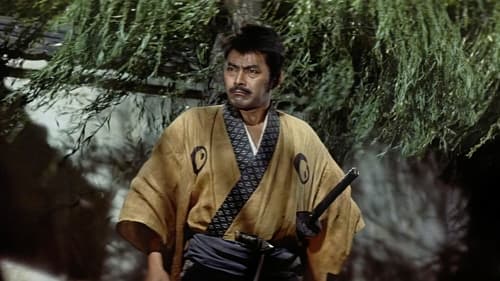
The story tells of a group of samurai who were left leaderless (becoming ronin) after their daimyo (feudal lord) was forced to commit seppuku (ritual suicide) for assaulting a court official named Kira Yoshinaka, whose title was Kōzuke no suke. The ronin avenged their master's honor after patiently waiting and planning for over a year to kill Kira. In turn, the ronin were themselves forced to commit seppuku for committing the crime of murder.
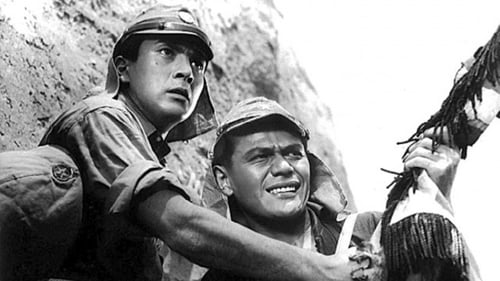
Lieutenant Masamune
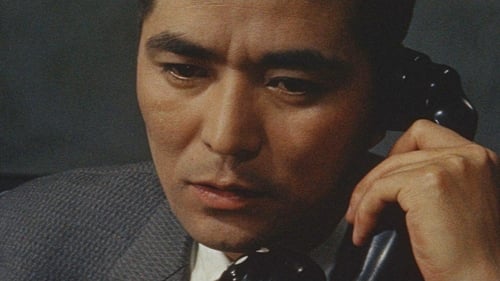
An employee at an oil cartel (Mihashi) is haunted by an act years before when he euthanized a fellow soldier when the two were adrift at sea during the Pacific War. Matters are complicated further when he falls in love with the soldier's younger sister (Tsukasa).
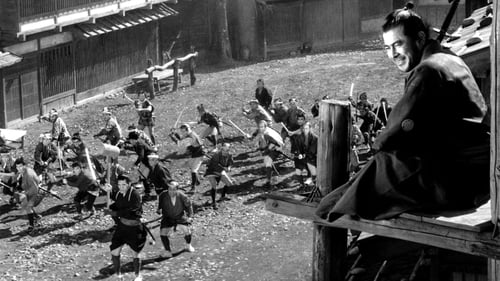
Homma, Instructor Who Skips Town
A história ocorre em 1860 e baseia-se na chegada de um ronin a uma cidade que sofre com a guerra entre duas gangues. Kuwabatake Sanjuro, que significa "Amoreira de 30 Anos" (Toshirō Mifune), aproveitando a sua perspicácia tenta ganhar dinheiro e, ao mesmo tempo, livrar a cidade das gangues rivais, ora associando-se a um grupo, ora associando-se a outro, tirando proveito da situação e manipulando-os, devido ao despreparo estratégico dos dois grupos, que é demonstrado através de diversas cenas satíricas durante o filme.

Katsuyasu Sakakibara
During the raging war between the Toyotomi and Tokugawa clans, the swordsman Mohei (whose family has been completely decimated) is recruited by Toyotomi to overcome the seat of power, Osaka Castle. Mohei's daredevil skills will be put to severe tests.

Detective
Um jovem vingativo se casa com a filha de um industrial corrupto, a fim de buscar justiça pelo suicídio de seu pai. Uma história de Kurosawa sobre o escândalo corporativo no Japão do pós-guerra. Um jovem tenta usar sua posição no coração de uma empresa corrupta para expor os homens responsáveis pela morte de seu pai. (e 14 - Estimado 14 Anos)

Lt. Koji Kitami is a navigator-bombardier in Japan's Naval Air Force. He participates in the Japanese raid on the U.S. Naval Base at Pearl Harbor in 1941 and is welcomed with pride in his hometown on his return. As Japan racks up victory after victory in the Pacific War, Kitami is caught up in the emotion of the time and fights courageously for the standard of Japanese honor. But his assuredness of his government's righteousness is shaken after the Japanese navy is defeated in the debacle of Midway.

Magistrate Jubei Matsui
Chuji Kunisada returns to his home village to find that Jubei Matsui, the corrupt magistrate, has been responsible for virtually destroying Kunisada's family. A final tragedy leads Kunisada to join with a band of rogues living in the forest in robbing from the rich and giving to the poor, always with an eye toward avenging himself on Magistrate Matsui.
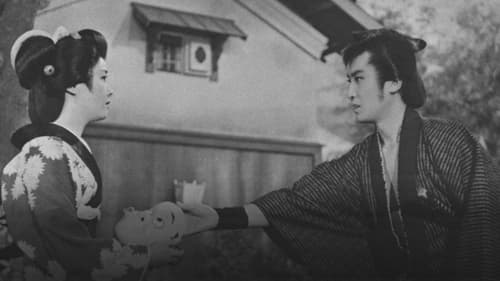
Boss Daihachi
Tossing his hat in the air to pick a direction, Yataro the wanderer sets out on a journey of adventure, not knowing what tomorrow may bring. The son of a Hatamoto, he has left the samurai life and become a yakuza, gambling on life's fortune and ready to risk his life at a moment's notice. Featuring an all-star cast that includes the debonair Azuma Chiyonosuke, this is a tale of excitement and action that brings the best of black and white to the silver screen. An adventure like no other, this is one of Kinnosuke's lost gems. A series of mishaps leads Yataro to watching over the beloved daughter of his close friend.
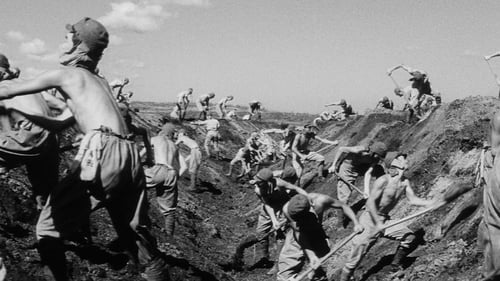
Naruto Nitôhei
A trilogia humanista de Kobayashi continua tendo, neste segundo filme, o idealista Kaji sendo mandado à longínqua Manchúria e com as mais selvagens atrocidades ocorrendo durante a Segunda Guerra Mundial. Ao descobrir que os soldados são cruelmente maltratados pelo seu sargento e oficiais, Kaji resolve fazer um protesto.

In World War II, the commanding officer of a sub, against his will takes on board two Western diplomats, to take them to the Canaries and arrange an armistice. When they get there, peace has been declared, but the sub's crew don't know as their radio has failed. They send their passengers ashore and go out to face a final battle...

The mythical adventures of the legendary Chinese trickster Monkey, who must outwit a variety of wily demons who stand in the way of him and his fellow Buddhist travelers. Though portrayed as a literal, if rather anthropomorphized, monkey in the original legends, this film substitutes the spindly comic actor Norihei Miki, sans makeup.
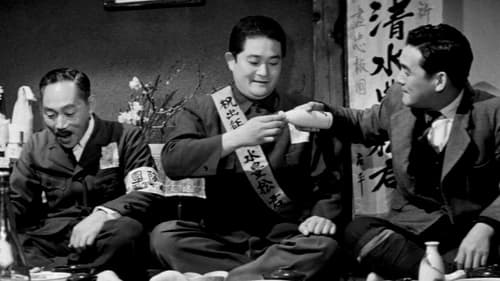
General Yano
On a post-war peaceful day in Japan, Toyomatsu Shimizu, a barber as well as a good father and husband, is suddenly arrested by the Prefectural Police as a war criminal and sued for murder.
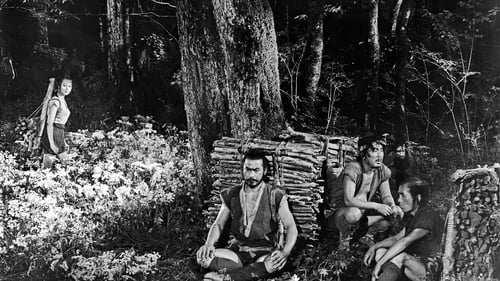
General Hyoe Tadokoro
Ambientado no século dezesseis no Japão, um solitário samurai escolta uma jovem princesa fugitiva através do território inimigo.

Kogoro Akechi
Adaptation of Edogawa Ranpo's novel.
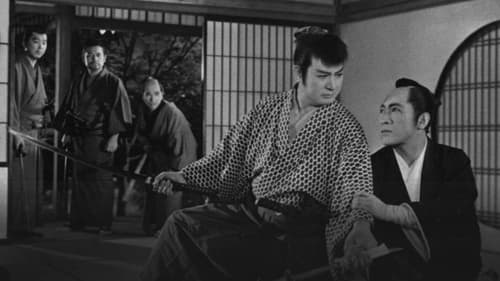
Bright samurai movie innovatively adapted from a classic story. A traveling masterless samurai is asked by a daughter of an established samurai family to pretend they are a married couple, and gets involved in the troubles of the samurai clan.
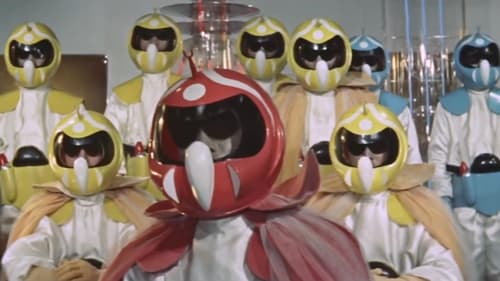
Gen. Morita
In Japan, scientifically advanced invaders from the war-destroyed planet Mysteroid cause an entire village to vanish, then send a giant robot out to storm the city by night, after which they request a small patch of land on Earth and the right to marry earthling women, claiming to be pacifists. Mankind must decide whether to capitulate or to resist.
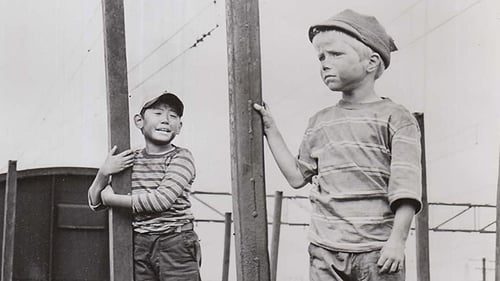
Um avião a caminho do Japão é forçado a pousar no mar perto da costa japonesa. Um pequeno menino americano sobrevive à escavação, mas é separado do resto dos passageiros e da tripulação e é levado por um pescador japonês, que leva o menino de volta à sua aldeia. O menino é ajudado pelo filho do pescador, mas quando vê a polícia japonesa invadindo a vila, eles temem que tenham feito algo errado e fugido, embora a polícia esteja apenas procurando pelo menino desaparecido. Juntos, os dois rapazes viajam pelo interior do Japão, tentando evitar que a polícia os procure e se encontre com muitos tipos diferentes de pessoas ao longo do caminho.
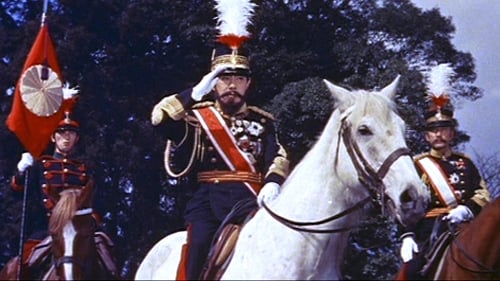
Kaoru Inoue
Meiji Tenno portrayed the ramp up to the Russo-Japan War. In addition to showing the political events that led to war, it also showed the era from the story of a farm family in rural Japan who sent their son off to war. As such, it could be considered an anti-war movie, showing how, while war is devised by governments, the people do not really understand what war is, and it's combatants often do not know what they are fighting for.

Based on the famous novel by Yamagami Itaro, this is the story of a group of ronin living in abject poverty in the latter days of the Edo period. Starring the great Konoe Jushiro, Ronin Gai is populated by an ensemble of colorful characters, social outcasts who patronize a restaurant and bar on the outskirts of Edo. Among them are masterless samurai reduced to drunkenness and debauchery. One disgraced and disillusioned former warrior gets a chance at redemption when he is hired to retrieve a famous knife from a corrupt lord. This is the third version directed by Makino Masahiro and is considered a true classic.

1956 Japanese film, originally released in two parts.

Admiral Isoroku Yamamoto leads the Combined Fleet of the Imperial Japanese Navy to defeat the American Fleet.

1956 Japanese film, originally released in two parts.

Japanese comedy film.

Dad
A little girl who falls into a lake and is saved by a god who then takes her up to the clouds and shows her what the world was like before she was born and what the world would be like if she where never born. While in the clouds she meets her grandparents and a few other people she loved who have passed on.

Japanese war film.

Kingorô Tamai
Dai-ni-bu: Aijô ruten: Kiyoshi Saeki directed movie

Kingorô Tamai
Dai-ichi-bu: Dôkai-wan no rantô - Kiyoshi Saeki directed movie.

Japanese war drama.

Jiro Nomura
O filme é sobre a missão suicida da Yamato para Okinawa em março 1945 para defender a pátria ameaçada por bombardeiros americanos. Adaptado do livro de 1952 de Mitsuru Yoshida "Requiem for the Battleship Yamato".

Dr. Oka
A group of Okinawan high school girls are drafted as nurses during the American invasion of the island. As the enemy army advances further, the situation for the girls becomes increasingly desperate as food and shelter run out and the number of injured climbs, leading to the film's tragic finale.

Iori Saotome
Jidai-geki starring Kanjuro Arashi
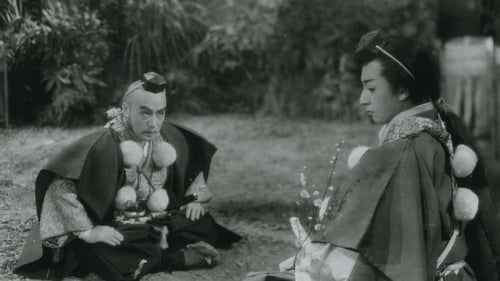
Togashi
Depois de vencer uma sangrenta batalha naval contra o clã rival Heike, o triunfante senhor Yoshitsune Minamoto retorna a Kyoto para assumir o comando. No entanto, seu irmão ciumento e invejoso, Shogun Yoritomo, ordena que seus homens prendam Yoshitsune e todos os seus camaradas. Devido a uma circunstância de sorte, Yoshitsune e seis de seus leais guardas samurais são capazes de escapar. Para ficarem verdadeiramente seguros, eles precisam viajar pelo país e encontrar abrigo na casa de uma única amiga, Idehira Fukiwara.
Este filme foi proibido no Japão por quase 8 anos. O lançamento original previsto foi em 1945. (e 12 - Estimado 12 Anos)

Shunsuke Washimi, a member of the karate club, misunderstands the affections of Chiyo, a lodging house girl who is in love with him and in the midst of a confusion challenges Yamauchi Tatsuhiko to a fight, forgetting the true core of martial arts, that should only be used as a selfdefense.

Chief Takagi
Japanese drama film.

Sergeant Odagiri
War film by Kon Ichikawa

Adaptation of the original story by Hida Yoshiro, whose depiction of the world of the yakuza is unparalleled. Gisuke, a weather-beaten yakuza with nostalgia and memories of love in his heart.
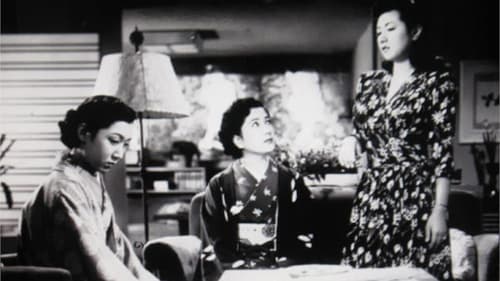
Mimaki

Kumasuke Arai
An early film by Kon Ichikawa

Ishimatsu
The tale of a feudal swordsman who cynically takes no responsibility for anything, relegating it to others, and then taking the credit.

Directed by Eisuke Takizawa

A film dealing with the comings and goings of individuals in the immediate postwar period.

Goro Asahina
A newly hired daily newspaper writer covering the society beat receives an assignment to cover Tokyo at night by walking and observing it. He gets into the right frame of mind by dressing the part as a vagrant with not a penny to his name. He gets into trouble ending up at the police station slammer overnight. He has no material to write about and, with his assignment unfulfilled, faces a cross editor.
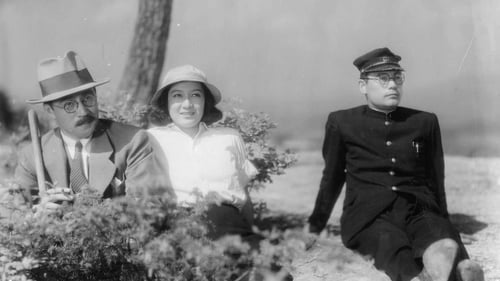
Ruykichi Noge
Yukie, a filha bem-educada de um professor universitário, fica chocada quando o seu pai é dispensado do seu cargo pelos seus ensinamentos políticos e ainda mais quando o seu amante, um aluno do seu pai, é preso e executado como espião. Ela decide deixar Kyoto para viver com os pais do rapaz na aldeia camponesa. Mas a vida ainda tem muitas lições para ela... (e 12 - Estimado 12 Anos)

Lord for a Night is a 1946 Japanese film directed by Teinosuke Kinugasa.

Fujita
Two sisters, one a dancer and the other a script supervisor at a big movie studio, become embroiled in union activities when a strike is called in sympathy with striking railroad workers, one of whom boards with the sisters and their parents. The girls' father argues with them about their strike, but finds his views changing when he himself loses his job.

Tadashi Imai 1946 movie

Goro Urashima
Reputedly based on Frank Capra’s 1939 film Mr. Smith Goes to Washington, A Descendant of Tarô Urashima is about a repatriated soldier who becomes populist politician in the Japanese Happiness Party.
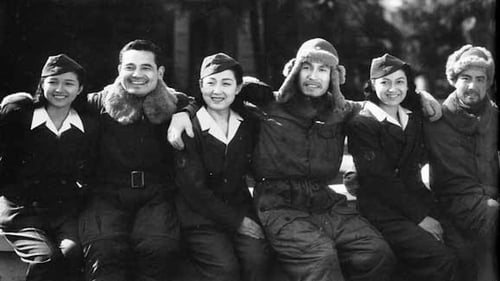
The story of an airport and its air traffic control crew in a remote and northern Japanese town. Three of the air traffic controllers are female with one of them working with her dead fiancé's sister. The engaged man had gone to war and never returned.

Yagyu Tajima-no-kami
During the Warring States era, Hozoin Kakuzenbo and Yagyu Tajima-no-kami, being best friends, spend their days acquiring skills of the spear, sword and martial arts. Hozoin loses a series of matches with master swordsman Kozumi Ise-no-kami. Bitterly ashamed, Hozoin embarks on a journey, trying to perfect his skills. A few years later, Hozoin is ready and it's time for the ultimate showdown with Ise-no-kami!

Sanshiro Sugata
In this government-suggested sequel, Sugata again grows as a judo master, and demonstrates his (and by extension, all Japanese) superiority to the foreign warrior.
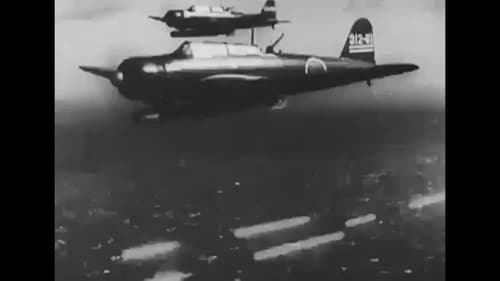
Mikami
Three IJN flyers Mikami (Susumu Fujita), Kawakami (Masayuki Mori) and Murakami (Akitake Kono) are good friends, and they are all renowned for their torpedo techniques. Mikami is posted as a staff officer at a base on an island in the Pacific. Kawakami and Murakami later joins him as the base squardron is reinforced. The enemy task force approaches the island and all three of them attack the fleet, killing themselves in the process.
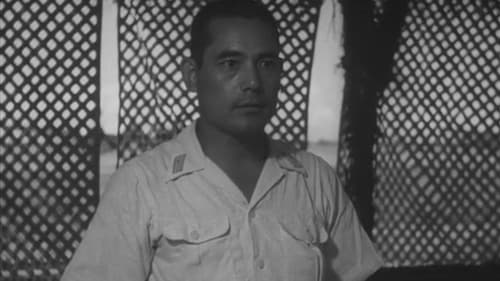
Colonel Kato
A 1944 propaganda film that depicts the fictionalised career of IJAAF pilot Tateo Kato, who led the 64th Sentai during the early months of the Pacific War. The film has scenes featuring Ki-43 fighters escorting Ki-21 bombers to attack Rangoon, where they are attacked by P-40 Warhawk and Brewster Buffalo fighters.

Kensuke Shibata
Set in wartime at the Yawata Steel Works in Tobata, Yawata, and Kokura cities in Fukuoka Prefecture, the film depicts people taking on the evil blast furnaces that prevent increased production. The film was shot on location at the actual Yawata Steel Works for an extended period of time, and special effects were created using a miniature blast furnace that closely reproduces the actual one.
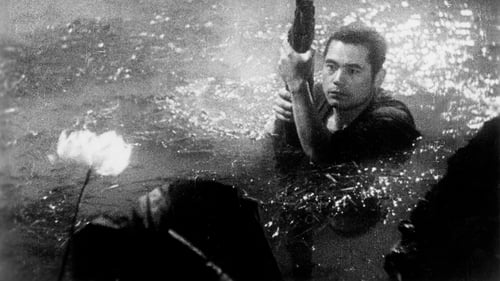
Sanshiro Sugata
A história de Sanshiro Sugata, um jovem teimoso e forte, que viaja para a cidade para aprender o jiu-jitsu. No entanto, ao chegar, ele descobre uma nova forma de autodefesa, o judo. O personagem principal é baseado em Shiro Saigo, um judoca lendário.
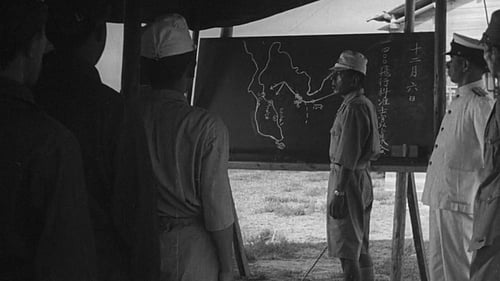
Yamashita
Japanese Navy air cadets train for the attacks on Pearl Harbor and the HMS Prince of Wales.

The premature death of a young mother serves as inspiration for her husband and son.

Set in Qingdao, China, a Japanese company locates an office there and begins work and cooperation with a local Chinese company for business. Many Japanese engineers also move to China, with their families, for the company in order to construct a canal. There are young Chinese resisting the Japanese in this area.
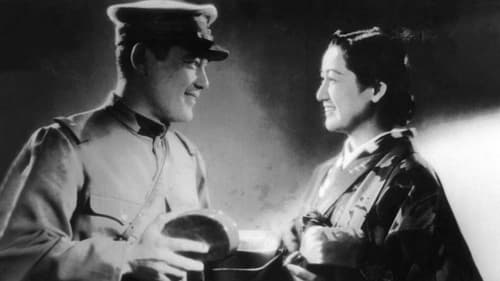
Shintaro Sagawa
In this semi-documentary, an older locomotive driver is tasked with training younger ones and is currently training two in particular. The old man is finding the task overwhelming as it is hard work with practical lessons and classroom components. His wife has died, but he has three daughters with the oldest taking care of her younger siblings.

A Japanese army engineer (Hasegawa) on the mainland must put his personal feelings for a beautiful Chinese woman (Ri) aside if he is to succeed at building a highway through the "bandit"- (aka anti-Japanese militia-) infested hinterlands.

Okumura Ioko story directed by Shiro Toyoda

Japanese propaganda film

The film was produced during Second Sino-Japanese War, before the Pearl Harbor Attack in 1941. The film mainly concerns the training of newly-recruited pilots and their daily life, then their subsequent fighting experiences in China. Army supported the production, providing all the authentic airplanes, training and actual actions. They even provided the older biplanes disguised as Chinese fighter planes. Obinata plays the trainer-turned-combat-leader, who is passionate and cool at the same time. All his boys love him, of course. The film is not as intense, full of sugar-coated camaraderie, until young pilots are killed in action one by one. Last twenty minutes are fairly grim, as the message of self-sacrifice is heard loud and clear.

Song of the White Orchid was a co-production of Toho and Mantetsu, the railway that served the colonial region of Manchuria, and the first film in the Kazuo Hasegawa/Shirley Yamaguchi (Ri Koran) “Continental Trilogy.” Handsome Hasegawa (representing Japan) runs up against an impertinent Yamaguchi (representing the continent); not surprisingly, in the course of the film the woman comes around and realizes the benevolent intentions of the Japanese. In Song of the White Orchid Yamaguchi leaves Hasegawa, who plays an expatriate working for the railway, because of a misunderstanding. She joins a communist guerilla group plotting to blow up the Manchurian railway. Learning of the subterfuge that led to the misunderstanding, she renews her faith in Hasegawa—and by extension Japan—and tries to undermine the plot.
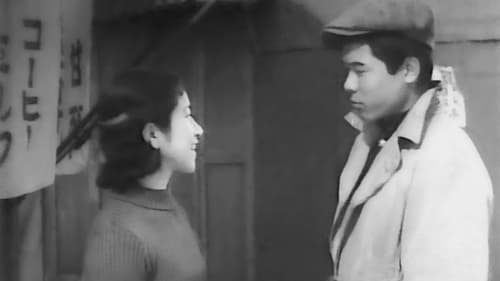
Genji's fellow worker
The Whole Family Works, Mikio Naruse's adaptation of a Sunao Tokunaga novel, feels more of a piece with the writer/director's quietly observant and psychologically charged later work. For the Naruse-familiar, it is an anomaly only in its placement within his filmography—indeed, this could be a film made by the elder, stasis-minded Naruse momentarily inhabiting, through a metaphysical twist of fate, his stylistically exuberant younger self. Set in depression-era Japan around the time of the Sino-Japanese War (which the director evokes, during a brief dream sequence, by dissolving between children's war games and actual adult warfare), The Whole Family Works gently observes a family coming apart at the seams. Ishimura (Musei Tokugawa) is the jobless father of nine children.
